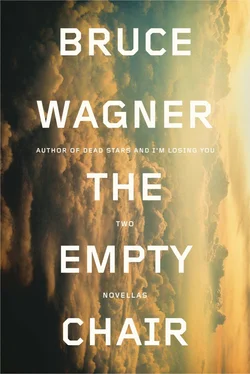Adamant that at any moment the saint would take his rightful seat, Kura and I were oblivious to having stumbled upon what was essentially a vigil. Meanwhile, I watched from my maypole aerie; sitting before the Master’s empty chair, my lover’s childlike anticipation lent him a radioactive energy. Now you may think I’m setting the stage for a dais of eulogizers — after all, I’ve just told you the siddha was dead. I said “vigil” too but if it was , then what— whom —was everyone waiting for?
This is where the American comes in.

Kura’s belated words on the phone, some 30 years after we met—“I’ve found him”—are the basis of the story I’m telling you. Understood. But before I can properly introduce the American, I need to talk about the American’s teacher .
It was 1997—27 years since I last saw— left him — in Bombay. There I was in my zillion-dollar apartment, minding my own business, hangin’ with the gargoyles… remember? I get the call from Grandmaster Flash and suddenly I’m on my way to Delhi. Whoosh. While airborne in my cashmere cabin, rope-a-doped on Seroquel, I start to retrieve all this— data —everything I’m telling you now — I’m busy downloading because I haven’t thought about any of it in absolute ages. I mean not really, not deeply, maybe never. Strange or funny or bullshitty as that may sound. But it’s true. There I am on the jet, cramming for my exam — filling in the potholes of a life that sometimes, most of the time, didn’t feel like my own. Because in that chunk of years after I left him there in dear ol’ Mumbai —from 1970 to 1997—well, dysthymic depression, shitty chemicals and general lovelornness ruled the roost, and sealed off so many rooms — all the bric-a-brac and most of the furnishings were in the lost and found. So now I’m eight miles high, on my way to Delhi, freshening up my frontal lobe… bear with me, honey, because I want you to be as prepared as I can make you before we touch down — and we will , and soon , I promise! I promise we’re landing in Delhi soon! I just want you to be able to give Kura your full attention when you finally meet him. Because if I don’t talk about what I’m about to, it’d just be rude —like blowing off the first act of a play and just bringing you at intermission. [sings] “Eight miles high! When you touch down… you’ll find that — it’s stranger than known…” The Byrds! Roger McGuinn! O my God! Get my granny glasses!
All right, I herewith present: Queenie’s A Brief History of the Great Guru.
Are you with me, bubba?
By the late-’60s, the enlightened tobacconist had achieved a level of fame commensurate with Ramana Maharshi and was informally admitted into the League of Superheroes of Nondualism. His followers — or shall I say far-flung legions of the desperate, the curious and the dilettantish, not to mention the usual pastiche of pop stars, paupers and spiritual tourists — traveled at great expense to be in his presence. He was genuinely delighted to greet them (the rishi could be downright chatty) though to call him gregarious would be naïve. Still, the question remained: Why was he so relentless in his public teachings if his philosophy defined quote-unquote enlightenment as a state of being that was not only impossible to earn or solicit but one that could only “ happen”? (Or not.) He was known to say that a fly was as likely to land on shit as it was on honey, meaning, the rara avis of satori found its way to the shoulders of vagrants and birdwatchers alike. It was his view (“My concept ,” as he used to emphasize) that all the meditation, chanting and scripture studying in the world meant nothing, including a trek to Bombay to sit at the feet of the Master. Because all was predetermined.
At the end of the day, I suppose the Great Guru gave satsang simply because he enjoyed it. Such enjoyment was “already written,” and part of his nature. He was in full agreement with the Bhagavad Gita , which advised that action was the thing, not the fruit of one’s action. He was also fond of telling disciples he was busy “fishing.” “I am looking for that big fish,” he’d say, a waggish glint in his eye. “The one that swims faster and deeper than the rest.” This cryptic declaration never failed to make him giggle; if his dentures fell out, he laughed even harder with what he called his “beggar’s mouth.” By this remark, one could wrongly infer he was trolling for a successor, but a proper saint has no interest in the tropes of lineage and continuity. Indeed, it might be said that a common thread among enlightened men was a certitude that none of their students had ever understood a word they uttered.
The loneliness of the long-distance bodhisattva…
In 1963, the Great Guru’s fishing pole received an enormous tug on the line.
While visiting a dentist in Miami, a blond, middle-aged gentleman picked up a Reader’s Digest with a wealthy woman’s account of her passage to India to meet a renowned “tobacconist saint.” He was intrigued. Gossip had it that for one week the American ruminated intensely on the article before tragedy intervened. Apparently, he was in the middle of an ugly divorce when his wife murdered their two young children. She attempted suicide but survived. During the trial, he left the States for good.
He was 48 years old when he landed in Bombay.
The Great Guru immediately noticed something different about the new arrival, a quality transcending the cold anarchies of grief. He knew he’d found a true adept, one whose self-realization was foretold — satori a priori ! — just as he, the Great Guru, was predestined to be his guide. But it would take some work. The American’s behavior was erratic. He’d vanish for days, sometimes weeks without notice, before reappearing to claim his usual spot at the foot of the sadhu’s chair. Sometimes after those mysterious layovers, he was disheveled and disoriented. The Great Guru would order the Kitchen Cabinet — those roly-poly sister-aunties — to bathe and feed the Big Fish, spruce up the aquarium if you will. Other times he alighted from his travels impeccably dressed in linen suit and tie, as if fresh from Hong Kong, Johannesburg, Genève. After months of obliviously submitting to his artful guru’s grooming, the American at last steadied his course.
In the year it took for the arriviste to settle, the Great Guru’s focus on him never wavered. The proprietary denizens of the inner circle dug in their heels, girding for the long haul, cynically reassuring themselves that teacher’s pets came and went and the newbie would be no exception. Others laid down odds the American was “next in line” and began kowtowing early. Through it all, the old sage cackled with delight. The idea of cultivating a favorite tickled his beggar’s mouth pink, because it was no longer possible for him to have a personal relationship with anyone he encountered along the journey. For he had ceased being a person.
None of which meant he wasn’t delighted upon learning his chela was a racetrack bookie on the side, nor that the two couldn’t regularly share a glass of whiskey in the cool, early evenings. Nor did it mean he wasn’t grateful for the acumen the American lent to the fledgling publishing enterprise on Mogul Lane. It was the expat who had suggested satsang be taped (it would have been reel-to-reel back then) and transcribed for wider dissemination. The Great Guru was enchanted by the idea and impishly rebuked his minions for not having thought of it first. How he enjoyed stirring the pot!
Читать дальше













